An Insider’s Guide to Navigating Chinese Business Dinners
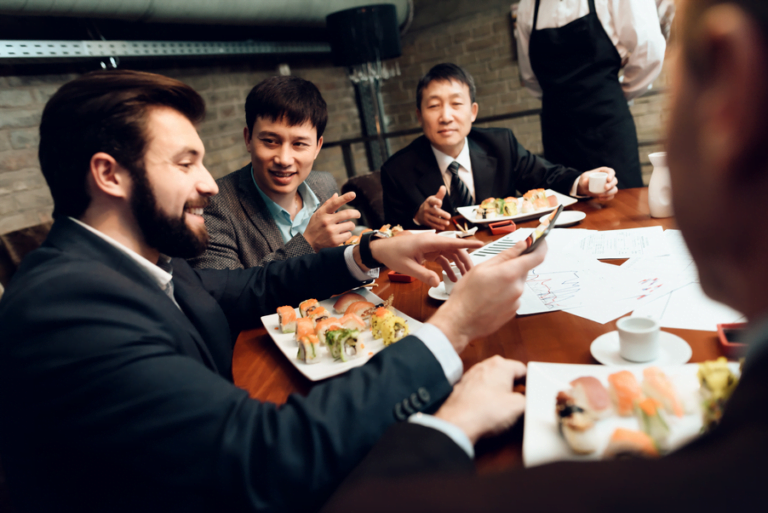
In Chinese business culture, the significance of the business dinner cannot be overstated. These dinners aren’t just about enjoying a meal. They’re deeply rooted in Chinese culture in business, so they play a pivotal role in establishing and nurturing business relationships.
For many, it’s a blend of formal business discussions and a testament to the cultural traditions in China. As a foreigner, understanding the nuances of business etiquette in China, especially during these dinners, can be the key to making a lasting impression.
Section 1: Arriving and meeting your hosts
Navigating a Chinese business dinner can be a unique experience, especially for those unfamiliar with the intricacies of Chinese culture in business. This section provides a brief overview of what to expect and how to make a positive first impression.
Be punctual — Arrive 5-10 minutes early
Being on time isn’t just a matter of courtesy. It’s a reflection of your commitment, professionalism, and respect for the host and the occasion. In fact, arriving late can be perceived as a sign of disregard or indifference, which can negatively impact business relations.
So it’s not just recommended but almost imperative to arrive 5-10 minutes early for a Chinese business dinner. This early arrival not only showcases your respect for the host and the importance you place on the meeting but also demonstrates your eagerness and enthusiasm to engage and collaborate.
In the context of Chinese culture, such gestures can go a long way in building trust and rapport, which are essential for fruitful business partnerships.
Related Reading: How to Say “Nice To Meet You” In Chinese: 10 Phrases
Dress professionally and conservatively
The way you present yourself can often speak volumes even before a single word is exchanged. When attending events or meetings in a foreign culture, attire becomes a silent communicator, conveying your attitude, intentions, and understanding of the cultural norms.
In the context of Chinese business dinner etiquette, dressing professionally and conservatively holds paramount importance.
Choosing clothes that are both professional and modest isn’t just about adhering to a dress code. It’s a tangible representation of your dedication and seriousness towards the business at hand. A well-thought-out ensemble can indicate that you value the opportunity and have taken the time to present your best self.
Of course, in Chinese culture, where respect and honor are deeply ingrained values, dressing appropriately is also a gesture of respect towards your hosts. It subtly communicates that you acknowledge and appreciate the cultural traditions and norms and are willing to align with them.
So, while the primary function of clothing is obviously to cover, in the world of Chinese business dinners, it also serves as a bridge — fostering understanding and mutual respect between different cultures and business practices.
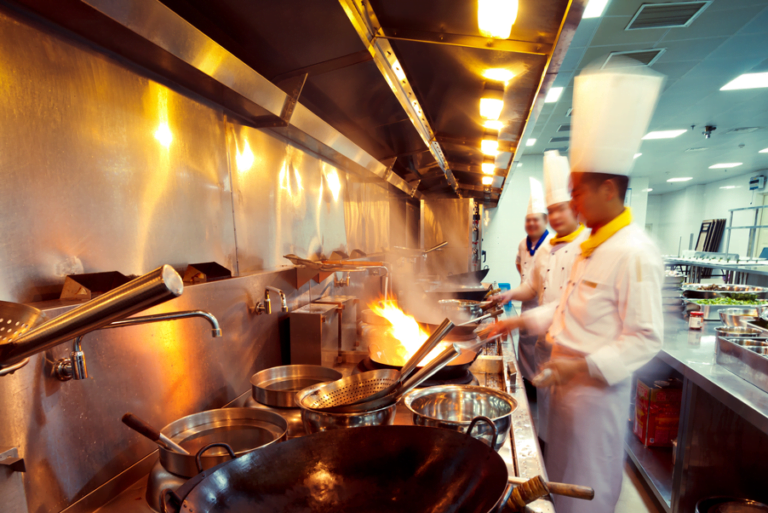
Greet your hosts with a slight nod or handshake
Navigating the intricacies of Chinese business dinner etiquette requires a keen understanding of both verbal and non-verbal cues. When attending a Chinese business dinner, the initial moments of interaction set the tone for the entire evening.
As you meet your hosts, it’s customary to greet them with a slight nod or a firm handshake. This seemingly simple gesture carries a depth of meaning and is a harmonious blend of Western and Chinese culture in business.
The nod, deeply rooted in cultural traditions in China, is a sign of respect and acknowledgment. It’s a silent way of conveying appreciation and recognition to the other party.
The handshake, more prevalent in Western business culture, signifies openness and a willingness to engage. By incorporating both these gestures, one effectively bridges the gap between two distinct business cultures, showcasing adaptability and cultural sensitivity.
Address people by their professional titles
The manner in which you address your counterparts plays a pivotal role. At a Chinese business dinner, it’s imperative to address individuals by their professional titles. This practice is deeply embedded in Chinese culture in business and is a reflection of the profound respect and hierarchy that permeates cultural traditions in China.
Using professional titles isn’t just a formality. It’s a testament to the individual’s achievements, position, and the role they play in their respective organizations. By doing so, you’re not only acknowledging their professional stature but also showing an understanding and appreciation of the business etiquette in China.
In a culture where respect and honor are paramount, such gestures can significantly influence the course of business interactions and discussions.
However, it’s also essential to be adaptable. If someone suggests that you address them in a more informal manner, it’s a sign of their comfort and trust in the relationship. But until that invitation is extended, adhering to the formalities showcases your respect for the business culture in China and the traditions that govern Chinese business dinners.
Read Our In-Depth Guide: Why Learn Mandarin Chinese?
Section 2: Seating arrangements and order of introductions
In the world of Chinese business dinners, every detail, from the seating arrangement to the order of introductions, is steeped in tradition and carries significant meaning. Understanding these nuances is essential for anyone looking to navigate the complexities of Chinese business dinner etiquette successfully.
Seating is hierarchical
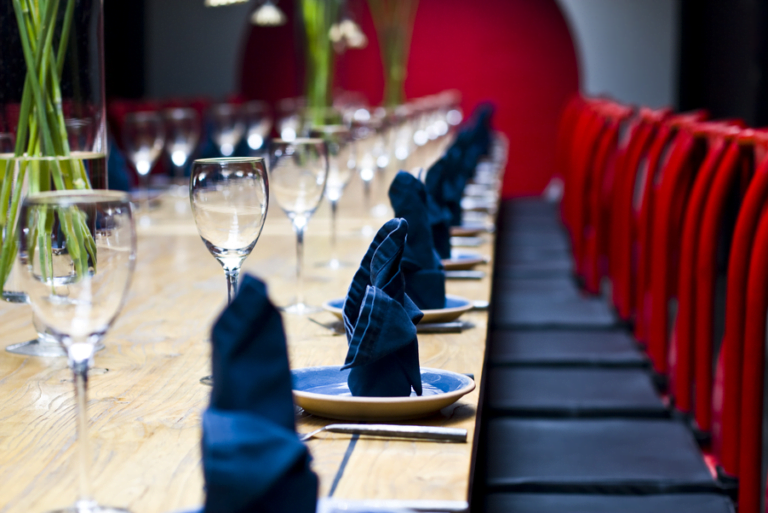
In Chinese culture in business, the seating arrangement at a business dinner is not arbitrary. It’s a reflection of the hierarchical nature of cultural traditions in China. Typically, the most senior or respected individual will be seated at the head of the table or in a position that faces the entrance.
As a guest, it’s crucial to observe where your hosts sit and take cues from them. Do not assume a seat without being directed, as this could inadvertently disrupt the established order and be seen as a breach of business etiquette in China.
Order of introductions
Introductions at a Chinese business dinner aren’t just a formality; they’re a ritual that follows a specific order, usually based on seniority. The most senior members are introduced first, followed by those of descending rank. This practice is deeply rooted in the business culture in China, where respect for seniority and position is paramount.
As a foreign guest, it’s essential to be patient and attentive during this process, acknowledging each introduction with a nod or a handshake, as appropriate.
Wait until seated to begin eating/drinking
Another vital aspect of Chinese business dinner etiquette is the practice of waiting until everyone is seated and the host has made the initial toast or gesture before starting to eat or drink. This shows respect for the host and the other attendees.
In the context of Chinese business dinners, such gestures, though seemingly small, can have a profound impact on the overall atmosphere and the progression of business discussions.
The intricacies of Chinese business dinner etiquette go beyond mere formalities. They are a reflection of the deep-rooted cultural traditions in China and the importance placed on respect, hierarchy, and harmony. Successfully navigating a Chinese business dinner requires an understanding of these traditions and a willingness to engage with them genuinely.
Related Reading: Best Way to Learn Mandarin By Yourself: 15 Essential Tips
Section 3: Dining customs and etiquette
Dining in China isn’t just a sensory experience. It’s a dance of customs, traditions, and etiquettes that have been honed over millennia. For those attending a Chinese business dinner, understanding these customs is incredibly important. It’s not just about the food. It’s about building relationships, showing respect, and navigating the intricate web of Chinese business dinner etiquette.
Learn how to use chopsticks properly
Chopsticks are more than just utensils in Chinese culture. They’re symbols of tradition and etiquette. If you’re unfamiliar with using them, it’s advisable to learn the basics before attending a Chinese business dinner. Using chopsticks correctly showcases your respect for Chinese culture in business and your willingness to engage with cultural traditions in China. It’s a small gesture, but one that can leave a lasting impression.
Do NOT point at people or touch food with fingers
Pointing at individuals or touching food directly with your fingers is considered impolite in Chinese dining etiquette. Instead, use the appropriate utensils and always be mindful of your actions. Such awareness showcases your understanding of the nuances of Chinese business dinner etiquette.
Try a bit of every dish served
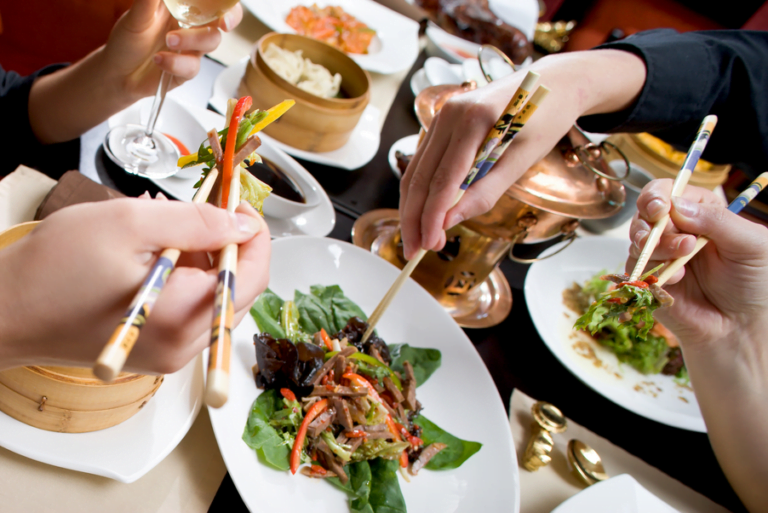
Chinese business dinners often feature a variety of dishes, each representing different aspects of Chinese cuisine. It’s considered polite and appreciative to try a bit of every dish served. This not only allows you to experience the richness of Chinese cuisine but also shows your respect and appreciation for the host’s efforts. You’ll probably get to try some new dishes that you might never have tried before, and that’s always fun!
Related Reading: How to Order Chinese Food in a Chinese Restaurant
Section 4: Communication tips and taboos
Engaging in a Chinese business dinner isn’t just about the food or the seating arrangements; it’s also about the art of conversation. Communication is a crucial aspect of Chinese business dinner etiquette, and understanding the nuances can make the difference between a successful evening and a faux pas. Here’s a deep dive into the communication tips and taboos to keep in mind.
Avoid controversial topics like politics
This is a bit of a no-brainer, really. While it’s natural to want to discuss current events or global affairs, it’s essential to tread carefully. Chinese culture in business places a high value on harmony and avoiding conflict. Topics like politics can be sensitive and are best avoided to ensure the conversation remains pleasant and constructive. Remember, the primary goal of Chinese business dinners is to build relationships, not debate contentious issues.
Let your hosts guide the conversation
In line with the cultural traditions in China, the host or the most senior person present often takes the lead in guiding the conversation. It’s respectful to follow their lead and engage in the topics they introduce. This approach not only aligns with business etiquette in China but also ensures that the conversation flows smoothly and remains within culturally acceptable bounds.
Be humble and do not brag
Humility is a valued trait in Chinese culture in business. While it’s okay to discuss achievements or successes, it’s essential to do so with modesty. Avoid overt bragging or self-promotion, as this can come off as arrogant and out of touch with the business culture in China. Instead, focus on collaborative achievements or express gratitude for opportunities and partnerships.
Do not refuse toasts when offered
Toasts are a significant part of Chinese business dinner etiquette. They are a way of showing respect, appreciation, and camaraderie. If a toast is offered to you, it’s polite to accept and reciprocate the gesture. Refusing a toast can be seen as a sign of disrespect and can create an awkward atmosphere.
Limit alcohol consumption
Of course, while toasts are integral to Chinese business dinners, it’s essential to be mindful of your alcohol consumption. Overindulging can lead to inappropriate behavior or comments, which can tarnish your reputation and the evening’s proceedings. It’s always a good idea to pace yourself and remain alert and composed throughout the dinner.
Related Reading: Drink like a Local — A Guide to Alcohol in China
Communication at a Chinese business dinner is a delicate balance of respect, awareness, and cultural sensitivity. By understanding and adhering to these tips and taboos, you can navigate the evening with grace and leave a lasting positive impression on your hosts and fellow attendees.
Section 5: After dinner and departure
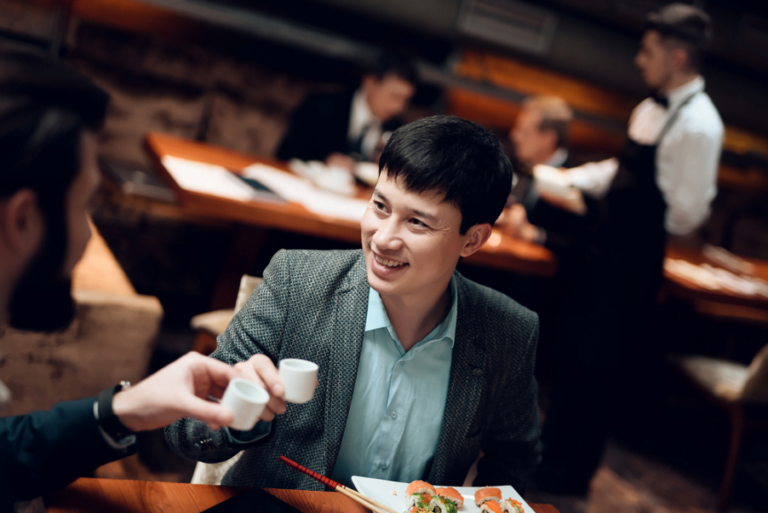
The end of a Chinese business dinner is as significant as its start. The way you depart can leave a lasting impression, making it crucial to understand and adhere to the nuances of Chinese business dinner etiquette even as the evening winds down.
Do not be the first to leave the table
In Chinese culture in business, it’s considered impolite to be the first to leave the table, especially if you’re a guest. The host or the most senior person present typically signals when the dinner has concluded. Leaving prematurely can be perceived as impatience or disinterest, which goes against the principles of respect and harmony that underpin business etiquette in China.
Express thanks to the hosts
Gratitude is a universal gesture, but in the context of Chinese business dinners, it takes on added significance. After the meal, it’s customary to express your thanks to the hosts for their hospitality. This simple act acknowledges the effort put into organizing the dinner and shows appreciation for the opportunity to engage with the business culture in China.
Related Reading: So Many Ways to Say “Goodbye in Chinese”
Offer to split the bill (but expect them to refuse)
While it’s customary in many cultures to split the bill, in Chinese culture in business, the host often takes on the responsibility of covering the entire cost. However, as a gesture of goodwill and in line with Chinese business dinner etiquette, it’s polite to offer to share the expense. That said, it’s also essential to be prepared for the host to decline the offer, as it’s a part of the cultural traditions in China to showcase generosity and hospitality.
Exchange contact info for follow-up
Chinese business dinners are rarely just about the meal. They’re about building and nurturing relationships. As the evening concludes, it’s a good practice to exchange contact information with the hosts and other attendees. This facilitates future communication and follow-ups, ensuring that the connections made during the dinner continue to flourish in the realm of business.
In essence, the after-dinner and departure phase of a Chinese business dinner is a delicate balance of respect, gratitude, and forward-thinking. By understanding and adhering to these customs, you can ensure that the evening concludes on a positive note, laying the foundation for fruitful future collaborations and deepening ties within the Chinese business landscape.
Related Guide: Is Chinese Hard to Learn?
Attending a Chinese business dinner can seem daunting, with its intricate web of customs and etiquette rooted in centuries of tradition. But with the right understanding and preparation, it can be a rewarding experience that paves the way for meaningful connections and partnerships.
As the global economy becomes increasingly interconnected, developing a deep understanding of Chinese business etiquette will only grow in importance. For those interested in immersing themselves further in this integral part of Chinese culture in business, we invite you to reserve your seat for our free webinar.
Discover the Mandarin Blueprint Method to speak Chinese three to five times faster. Harness memory hacks for rapid literacy and transform your mindset to become a true Chinese speaker.
Imagine conversing fluently in Mandarin, understanding Chinese business nuances, and standing out in global interactions. All of this can be yours. Don’t wait. Secure your spot now and accelerate your Mandarin journey!








